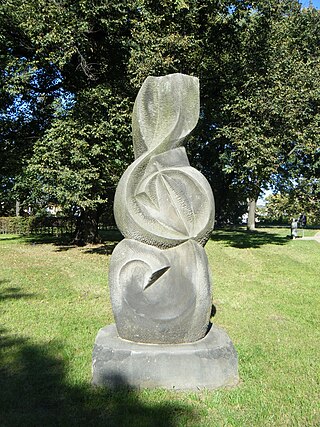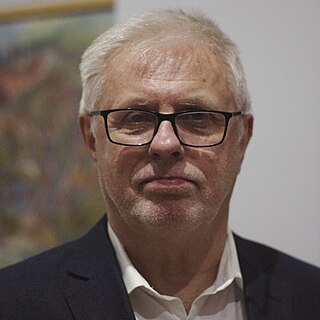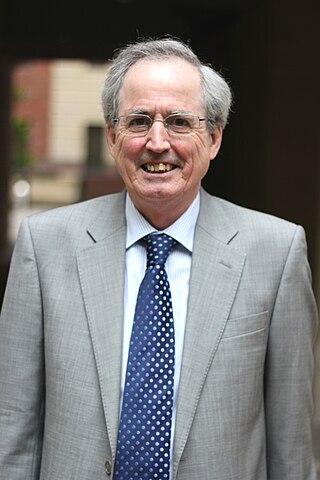Adrian Thomas is Emeritus Professor of Music at Cardiff University School of Music. He specializes in Polish Music.
Adrian Thomas is Emeritus Professor of Music at Cardiff University School of Music. He specializes in Polish Music.
Thomas began his professional career at Queen's University Belfast in 1973. Between 1983 and 1984, he was a visiting fellow at University of California, San Diego, and after his return to Queen’s University he became the Hamilton Harty Professor of Music in 1985. He held this position until 1996, when he took up his role at Cardiff University. He retired in 2010.
In addition to this, in 1983, 1986 and 1987, he held composition fellowships at the MacDowell Colony in New Hampshire. Between 2003 and 2006, Thomas was the Professor of Music at Gresham College in London.
In the late 1970s and early 1980s, Thomas conducted concerts with the Ulster Orchestra and contemporary music ensembles such as Lontano. In the 1980s he had several compositions broadcast by BBC Radio 3, including a commission for the BBC Singers, Black Rainbow (1989). In 1990-93 he was seconded by Queen’s University to the BBC, to become the Head of Music for BBC Radio 3, where, in 1993, he initiated the music and arts festival, Polska!, a nationwide celebration of Polish music and culture.
Between 2003 and 2006, as Gresham Professor of Music, Thomas delivered series of public lectures on Polish and Central European music. He was subsequently elected a Fellow of Gresham College (2006–09) and Emeritus Professor in 2009.
He has served on public committees and boards at the Arts Councils in Northern Ireland and Wales and on the Research Panel for the Performing Arts at the Arts and Humanities Research Board (2000–03).
Adrian Thomas is a specialist on Polish music and has published widely on the topic. He has given research papers, public talks and broadcasts in Europe, the USA and Australia. He is the author of over fifty entries on twentieth-century Polish music in the Second Edition of The New Grove Dictionary of Music and Musicians (2000–01). For his 1997 book, Górecki, Thomas received the Wilk Book Prize for Research in Polish Music (2002). He has received awards from the Polish Composers' Union (1989), the Polish Government (Order of Merit for Polish Culture, 1996) and the Lutosławski Society in Warsaw (2005).

Henryk Mikołaj Górecki was a Polish composer of contemporary classical music. According to critic Alex Ross, no recent classical composer has had as much commercial success as Górecki. He became a leading figure of the Polish avant-garde during the post-Stalin cultural thaw. His Anton Webern-influenced serialist works of the 1950s and 1960s were characterized by adherence to dissonant modernism and influenced by Luigi Nono, Karlheinz Stockhausen, Krzysztof Penderecki and Kazimierz Serocki. He continued in this direction throughout the 1960s, but by the mid-1970s had changed to a less complex sacred minimalist sound, exemplified by the transitional Symphony No. 2 and the Symphony No. 3. This later style developed through several other distinct phases, from such works as his 1979 Beatus Vir, to the 1981 choral hymn Miserere, the 1993 Kleines Requiem für eine Polka and his requiem Good Night.
Richard Sambrook is a British journalist, academic and a former BBC executive. He is Emeritus Professor in the School of Journalism, Media and Culture at Cardiff University. For 30 years, until February 2010, he was a BBC journalist and later, a news executive.

Cardiff University is a public research university in Cardiff, Wales. It was established in 1883 as the University College of South Wales and Monmouthshire and became a founding college of the University of Wales in 1893. It was renamed University College, Cardiff in 1972 and merged with the University of Wales Institute of Science and Technology in 1988 to become University of Wales College, Cardiff and then University of Wales, Cardiff in 1996. In 1997 it received degree-awarding powers, but held them in abeyance. It adopted the operating name of Cardiff University in 1999; this became its legal name in 2005, when it became an independent university awarding its own degrees.

Christopher Jarvis Haley Hogwood was an English conductor, harpsichordist, writer, and musicologist. Founder of the early music ensemble the Academy of Ancient Music, he was an authority on historically informed performance and a leading figure in the early music revival of the late 20th century.

Witold Roman Lutosławski was a Polish composer and conductor. Among the major composers of 20th-century classical music, he is "generally regarded as the most significant Polish composer since Szymanowski, and possibly the greatest Polish composer since Chopin". His compositions—of which he was a notable conductor—include representatives of most traditional genres, aside from opera: symphonies, concertos, orchestral song cycles, other orchestral works, and chamber works. Among his best known works are his four symphonies, the Variations on a Theme by Paganini (1941), the Concerto for Orchestra (1954), and his cello concerto (1970).

Gresham College is an institution of higher learning located at Barnard's Inn Hall off Holborn in Central London, England that does not accept students or award degrees. It was founded in 1597 under the will of Sir Thomas Gresham, and hosts over 140 free public lectures every year. Since 2001, all lectures have been made available online. As of 2024 the Provost is Professor Martin Elliott.

Warsaw Autumn is the largest international Polish festival of contemporary music. For many years, it was the only festival of its type in Central and Eastern Europe. It was established in 1956 by two composers, Tadeusz Baird and Kazimierz Serocki, and officially established by the Head Board of the Polish Composers' Union. It is an annual event, normally taking place in the second half of September and lasts for 8 days.

The Symphony No. 3, Op. 36, also known as the Symphony of Sorrowful Songs, is a symphony in three movements composed by Henryk Górecki in Katowice, Poland, between October and December 1976. The work is indicative of the transition between Górecki's earlier dissonant style and his later more tonal style and "represented a stylistic breakthrough: austerely plaintive, emotionally direct and steeped in medieval modes". It was premièred on 4 April 1977, at the Royan International Festival, with Stefania Woytowicz as soprano and Ernest Bour as conductor.
Miserere, Op. 44 is a choral work composed in 1981 by Henryk Górecki for large a cappella mixed choir. The text comprises five words: 'Domine Deus Noster', which are repeated for the first ten sections, resolved by a chorus of 'Miserere nobis' in the eleventh and final section. Both lines of text are sung as imploring pleas. A typical performance lasts 35 minutes.

Bolesław Szabelski was a Polish composer of modern classical music. While his style shifted and varied over the course of his life, he is best known for his atonal work composed during the 1950s and 1960s.

Christopher Dye FRS, FMedSci is a biologist, epidemiologist and public health specialist. He is Professor Emeritus of Epidemiology at the University of Oxford and formerly Director of Strategy at the World Health Organization.
Holy minimalism, mystic minimalism, spiritual minimalism, or sacred minimalism are terms, sometimes pejorative, used to describe the musical works of a number of late-twentieth-century composers of Western classical music. The compositions are distinguished by a minimalist compositional aesthetic and a distinctly religious or mystical subject focus.
Maja Trochimczyk is an American music historian, writer and poet of Polish descent. She published six poetry books: Rose Always – A Love Story, 2017; Miriam's Iris, or Angels in the Garden, 2008; Slicing the Bread: Children's Survival Manual in 25 Poems ; Into Light: Poems and Incantations; The Rainy Bread – Poems from Exile,, 2016; an anthology Chopin with Cherries, 2010), and a multi-faith anthology Meditations on Divine Names.

Totus Tuus Op. 60 was written for unaccompanied mixed choir by the Polish composer Henryk Górecki in 1987. Górecki composed the piece to celebrate Pope John Paul II's third pilgrimage to his native Poland that summer, and the work remains his best-known, if not critically acclaimed, a cappella choral piece of the 1980s. Indeed, Totus Tuus has been described as a contemporary classic.
Two Sacred Songs, Op. 30 is a 1971 work by the Polish composer Henryk Górecki for baritone and piano; the lyrics are two poems in Polish by Marek Skwarnicki. Although the music demonstrates the sacred and contemplative aspect of Górecki's music, the piece still bears the traces of the earlier period of Górecki's composition, as is marked by a more violent and dissonant aspects of the work.

Eugeniusz Knapik is a Polish pianist and composer of classical music best known for his 1980 chamber piece String Quartet No. 1. Knapik studied composition and piano with Henryk Górecki (1933–2010) and Czesław Stańczyk at the University of Music in Katowice. As a pianist, he has recorded widely, mainly in 20th-century music. He has won numerous prizes for his compositions, including at the Festival of Polish Piano Interpretation in Słupsk, and the International Chamber Music Competition in Vienna.
Arnold Whittall is a British musicologist and academic. Whittall's research areas have primarily been centred around the musical analysis of 20th-century music and aspects of the nineteenth-century, such as the music of Richard Wagner. He is Professor Emeritus of Musical Theory and Analysis at King's College London, having worked as Professor there between 1975 and 1996.
Carolin Susan Crawford is a British communicator of science and astrophysicist. She is an emeritus member of the Institute of Astronomy, Cambridge and an emeritus fellow of Emmanuel College, Cambridge.

Bohdan Pociej was a Polish musicologist and writer who studied historical parallels between music and philosophy. His work mainly focused on Baroque and Romantic music. He wrote about the phenomenology of Husserl and Ingarden, and also about hermeneutics. Pociej was the author of several documents about Bach and Mahler; he examined music's role in the cultural complex and the intellectual trends of its period.

Raymond Flood is Emeritus Fellow and a member of the Continuing Education Department at Kellogg College, Oxford, and has been a Professor of Geometry at Gresham College.